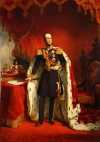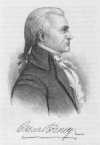 The Capgras Delusion is a rare disorder in which a person holds the delusional belief that an acquaintance—usually a spouse or other close family member—has been replaced by an identical impostor. Found in patients diagnosed with schizophrenia, dementia, or those suffering from a brain injury, the disorder is named after Joseph Capgras, the French psychiatrist who first described it in 1923. What have researchers since learned about the disorder? Discuss
The Capgras Delusion is a rare disorder in which a person holds the delusional belief that an acquaintance—usually a spouse or other close family member—has been replaced by an identical impostor. Found in patients diagnosed with schizophrenia, dementia, or those suffering from a brain injury, the disorder is named after Joseph Capgras, the French psychiatrist who first described it in 1923. What have researchers since learned about the disorder? Discuss
Source: The Free Dictionary
 William served in the Peninsular War, was wounded at Waterloo, and led the Dutch army in the Belgian revolution after his father failed to approve his conciliation efforts. Called to the throne upon his father’s abdication in 1840, William was immediately confronted with a financial crisis, which was solved by raising a “voluntary loan” among the people. A conservative leader, he resisted constitutional revision until the revolutionary spirit of 1848 induced him to grant what desired reforms?
William served in the Peninsular War, was wounded at Waterloo, and led the Dutch army in the Belgian revolution after his father failed to approve his conciliation efforts. Called to the throne upon his father’s abdication in 1840, William was immediately confronted with a financial crisis, which was solved by raising a “voluntary loan” among the people. A conservative leader, he resisted constitutional revision until the revolutionary spirit of 1848 induced him to grant what desired reforms?  This waterside festival is held for four days in
This waterside festival is held for four days in  Rodney was a key American Revolutionary leader. As a member of the Continental Congress, when he heard of the deadlock on the vote for independence, he rode 80 miles through a thunderstorm to arrive in Philadelphia “in his boots and spurs” on July 2, 1776—just in time to cast the decisive vote in favor of independence. The wording of the Declaration of Independence was approved two days later, and Rodney became a signatory on August 2. Soon after, he was elected president of what?
Rodney was a key American Revolutionary leader. As a member of the Continental Congress, when he heard of the deadlock on the vote for independence, he rode 80 miles through a thunderstorm to arrive in Philadelphia “in his boots and spurs” on July 2, 1776—just in time to cast the decisive vote in favor of independence. The wording of the Declaration of Independence was approved two days later, and Rodney became a signatory on August 2. Soon after, he was elected president of what?  Kshatriya is Hindu India’s military varna, or caste. In ancient times, it was considered the highest varna, but it was later supplanted by the priestly Brahman class. The legend of the caste’s demotion by Vishnu may reflect a historical struggle for power between priests and rulers. According to Hindu texts, Kshatriyas studied the ancient martial arts, which were eventually carried by Buddhist monks to China and Japan. “Kshatriya” derives from the Sanskrit word meaning what?
Kshatriya is Hindu India’s military varna, or caste. In ancient times, it was considered the highest varna, but it was later supplanted by the priestly Brahman class. The legend of the caste’s demotion by Vishnu may reflect a historical struggle for power between priests and rulers. According to Hindu texts, Kshatriyas studied the ancient martial arts, which were eventually carried by Buddhist monks to China and Japan. “Kshatriya” derives from the Sanskrit word meaning what?  Through an alliance with his father-in-law, Mithradates VI of Pontus, Armenian King Tigranes the Great extended his conquests across Asia Minor and founded Tigranocerta—the modern Siirt, Turkey—as the capital of his large empire. In 69 BCE, Roman forces led by General Lucullus captured Tigranocerta. With the aid of Tigranes’s son, Pompey vanquished Tigranes, who lost all of his conquests and had to pay tribute to Rome. What early form of chemical warfare was employed during the battle?
Through an alliance with his father-in-law, Mithradates VI of Pontus, Armenian King Tigranes the Great extended his conquests across Asia Minor and founded Tigranocerta—the modern Siirt, Turkey—as the capital of his large empire. In 69 BCE, Roman forces led by General Lucullus captured Tigranocerta. With the aid of Tigranes’s son, Pompey vanquished Tigranes, who lost all of his conquests and had to pay tribute to Rome. What early form of chemical warfare was employed during the battle?